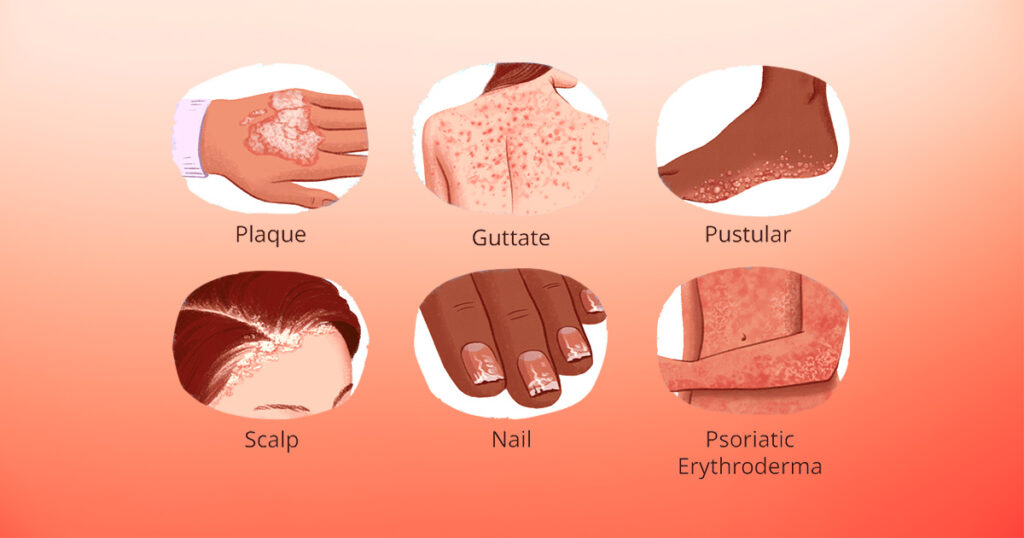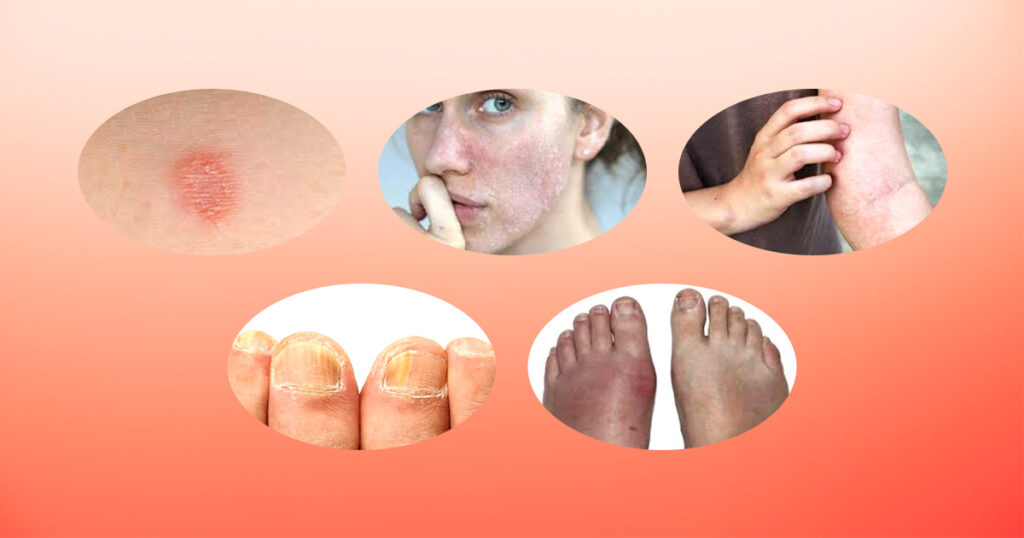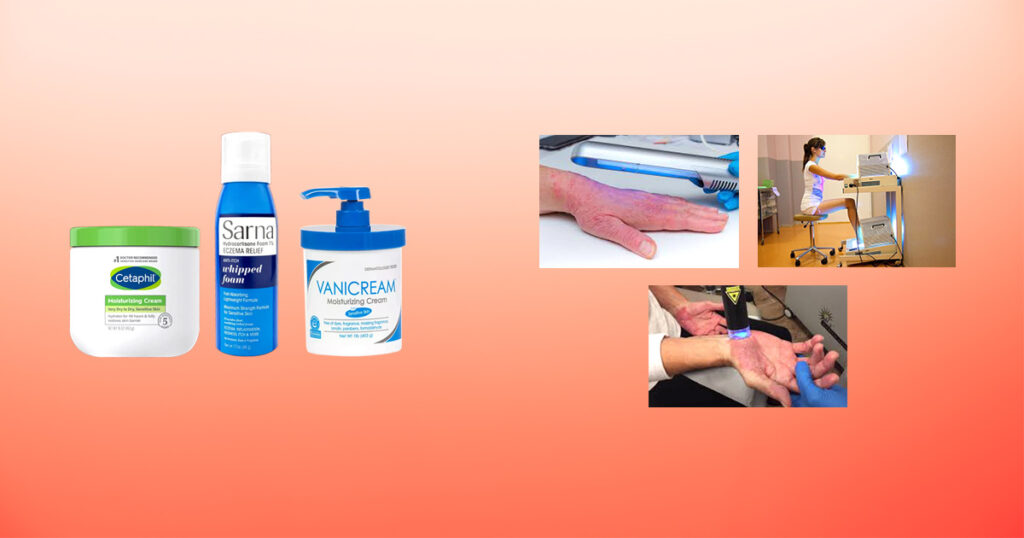What Is Psoriasis and How to Get Rid of It
Learn what psoriasis is and discover simple tips on how to manage and reduce symptoms for smoother skin. Read now for relief!

Psoriasis is a long-term skin condition that affects many people worldwide. It’s an autoimmune disease that causes skin cells to grow too quickly, forming thick, scaly patches.
These patches, or plaques, can be red, inflamed, and painful. They often appear on the wrists, knees, scalp, and lower back but can be anywhere on the body.
This article explains what psoriasis is and looks at treatments to help manage its symptoms.
What causes psoriasis?
Psoriasis occurs when the immune system mistakenly attacks healthy skin cells, causing new skin cells to form quickly.
Normally, skin cells grow and shed every 28 to 30 days, but in psoriasis this process can take only 3 to 4 days. The wrinkles are formed by the rapid accumulation of skin cells.
Although the exact causes of psoriasis are not fully understood, several factors can trigger or exacerbate the condition:
- Heredity: Psoriasis tends to run in families. If one or both of your parents have psoriasis, you are more likely to develop it.
- Immune system dysfunction: Since psoriasis is an autoimmune disease, the immune system plays an important role. Abnormal immune responses lead to inflammation and rapid skin cell turnover.
- Environmental triggers: Stress, skin injuries, infections (such as strep throat), and certain medications can cause flare-ups.
- Lifestyle factors: Smoking, excessive alcohol consumption and obesity can aggravate symptoms.

Types of Psoriasis
There are several types of psoriasis, each with its own characteristics:
1. Plaque Psoriasis: The most common form, characterized by raised, red patches covered with silvery scales. These plaques can appear anywhere on the body.
2. Guttate Psoriasis: This type appears as small, dot-like lesions, usually triggered by bacterial infections like strep throat.
3. Inverse Psoriasis: Found in body folds such as the armpits, groin, and under the breasts, this type appears as smooth, red patches that worsen with friction and sweating.
4. Pustular Psoriasis: Characterized by white pustules (blisters of non-infectious pus) surrounded by red skin. It can appear on specific areas, such as the hands and feet, or cover the entire body.
5. Erythrodermic Psoriasis: A rare but severe form of psoriasis that causes widespread redness, scaling, and pain across the body. It requires immediate medical attention.

Symptoms of psoriasis
Psoriasis symptoms can vary depending on the type and severity. Common symptoms include:
- Red patches of skin covered with thick silver scales
- Dry and cracked skin that can cause bleeding
- Itching, burning, or soreness
- Thickened or ridged nails
- Stiff and swollen joints (in cases of psoriatic arthritis)
Symptoms range from mild, affecting only a small area of the skin, to severe, involving large areas, and significantly affecting quality of life.

How to Get Rid of Psoriasis: Treatment Options
Several treatments are available to help manage the symptoms and reduce flare-ups. Treatment typically depends on the type and severity of the condition, and it may involve a combination of therapies.
1. Topical treatment
Topical treatments are often the first line of defense against mild to moderate psoriasis. These products are applied directly to the skin and can help reduce inflammation and slow the growth of skin cells.
- Corticosteroids: These anti-inflammatory medications and ointments are commonly used to treat mild forms of psoriasis. They reduce redness and inflammation and help relieve pain.
- Vitamin D analogs: These synthetic forms of vitamin D, such as calcipotriene, help slow the growth of skin cells.
- Retinoids: Topical retinoids, such as whole wheat germ, help exfoliate dead skin cells and reduce inflammation.
- Charcoal tar: This treatment helps reduce grease, pain and inflammation. It is also available in shampoos, creams and oils.
- Moisturizer: While not really a cure, it is essential by keeping the skin well moisturized to prevent dryness and cracking.

2. Phototherapy (Light Therapy)
Phototherapy involves exposing the skin to controlled amounts of ultraviolet (UV) light. This treatment can help slow the growth of skin cells and reduce inflammation.
- UVB Phototherapy: This is the most common form of light therapy, using UVB light to treat affected areas. It can be administered in a doctor’s office or with a home phototherapy unit.
- PUVA Therapy: This involves combining a medication called psoralen with UVA light. The psoralen makes the skin more sensitive to light, enhancing the effectiveness of the treatment.
- Excimer Laser: This laser treatment delivers high-intensity UVB light to specific areas of the skin, targeting plaques without affecting surrounding healthy skin.
3. Systemic Medications
For moderate to severe psoriasis, systemic medications may be prescribed when other treatments are ineffective. These can be taken orally or injected and work throughout the body.
- Biologics: These drugs, such as adalimumab, etanercept and infliximab, target specific aspects of the immune system to reduce inflammation and slow the progression of psoriasis
- Methotrexate: This drug suppresses the immune system and reduces skin cell production and inflammation.
- Cyclosporine: Another immunomodulatory drug, cyclosporine, can be effective in severe cases but is often used for short periods of time because of possible side effects
- Oral retinoids: These are related to vitamin A and can help reduce skin cell production. Acitretin is commonly used in severe psoriasis.

4. Lifestyle and home remedies
In addition to medication, lifestyle changes and home remedies play an important role in the management of psoriasis:
- Moisturize Regularly: Fresh water can dehydrate your skin and cause dry, itchy skin.
- Manage stress: Stress is a well-known trigger for psoriasis flares, so incorporating relaxation techniques such as meditation, yoga and deep breathing can be beneficial
- A healthy diet: Eating a well-balanced diet rich in antioxidant foods like fruits, vegetables and omega-3 fatty acids can help reduce inflammation
- Avoid Triggers: Identify and avoid specific triggers that can worsen your symptoms, such as smoking, alcohol abuse, and certain foods.
Why Choose Dr. Hanan Dermatology Specialty Clinic for Best Psoriasis Treatment in Chennai ?
Expertise and Experience
Dr. Hanan is a Best skin doctor in Chennai with years of experience treating psoriasis. Her team is skilled in handling complex cases and improving patients’ quality of life with personalized care.
Cutting-Edge Treatments
We offer the latest psoriasis treatments, including:
- Topical Treatments: Corticosteroids, vitamin D analogues, and retinoids.
- Phototherapy: Excimer laser treatments.
- Systemic Medications: Oral or injectable drugs for severe cases.
- Biologic Therapies: Advanced treatments targeting the immune system.
Personalized Treatment Plans
We create custom treatment plans based on your specific needs, considering the severity of your condition and overall health.
Holistic Approach
We focus on treating the whole person, including lifestyle changes, nutrition, and stress management, to help manage and control psoriasis effectively.
The Psoriasis Treatment Process
1. Comprehensive Consultation: We assess your medical history, symptoms, and previous treatments.
2. Customized Treatment Plan: Tailored to alleviate symptoms and prevent flare-ups.
3. Ongoing Monitoring and Support: Continuous care to ensure effective management and improvement.
Patient Success Stories
Our patients have experienced significant improvements. Many have shared how our advanced treatments and personalized care have transformed their lives.
Schedule Your Consultation Today
For the best psoriasis treatment in Chennai, visit Dr. Hanan Dermatology Specialty Clinic. Schedule your consultation now and start your journey towards clearer, more comfortable skin.
Conclusion
Psoriasis is a complex and often frustrating condition, but with the right treatment plan and lifestyle adjustments, it can be managed effectively.
Whether through topical treatments, phototherapy, systemic medications, or home remedies, there are many ways to reduce the symptoms of psoriasis and improve your quality of life.
FAQ’s
The most common form of plaque psoriasis produces raised patchy areas of skin. The color of the lines depends on your skin tone and can be yellow, gray or yellow. The movement appears as white, silver or gray.
Psoriasis is a long-term condition that doesn't have a cure, but treatment can help reduce your symptoms.
Flare-ups can last anywhere from a few weeks to a few months. Treatment can help you recover faster. When your symptoms disappear, your psoriasis is in remission. Remission can last for months or even years.

